The Books of David G. Hartwell: The Dark Descent and The World Treasury of Science Fiction
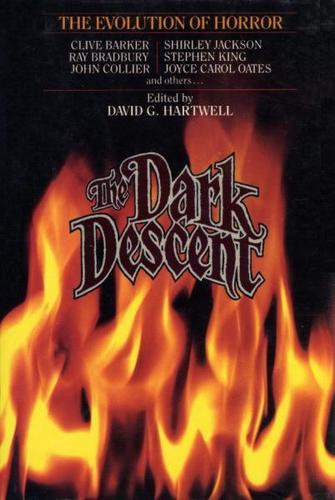 |
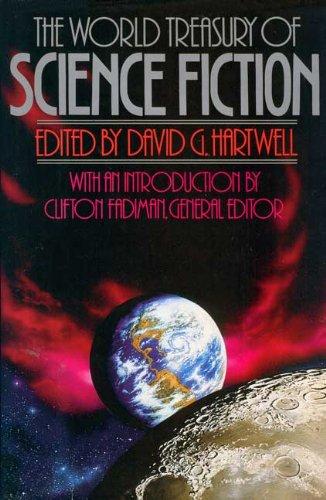 |
We lost David Hartwell on January 20th. This is our second article in a series that looks back at one of the most productive careers in our industry.
Last time we looked at two of David’s earliest anthologies, Masterpieces of Fantasy and Enchantment and Masterpieces of Fantasy and Wonder, released in 1988 and 1989. Here I want examine two more monumental anthologies he produced in the late 80s, both seminal to the field: The Dark Descent (October 1987) and The World Treasury of Science Fiction (January 1989).
The Dark Descent, subtitled The Evolution of Horror, is one of the most important horror anthologies ever published. Weighing in at a massive 1104 pages, it’s one of the most detailed and insightful surveys of horror fiction we have. Showcasing 56 of the best horror stories ever written, it traces the development of modern horror from the classic work Edgar Allan Poe, M. R. James, Charles Dickens and H. P. Lovecraft, all the way to Shirley Jackson, Manly Wade Wellman, Fritz Leiber, Karl Edward Wagner, Philip K. Dick, Gene Wolfe, and Stephen King. The Dark Decent won the World Fantasy Award for Best Anthology.
One thing I especially liked about this book is that David did not stint on longer stories. He included a total of five short novels, including Gene Wolfe’s classic “Seven American Nights,” and one of the finest horror stories ever told, Michael Shea’s brilliant “The Autopsy”:
“How Love Came to Professor Guildea” Robert Hichens (1897)
“The Willows” Algernon Blackwood (1907)
“The Beckoning Fair One” by Oliver Onions (1911)
“Seven American Nights” by Gene Wolfe (1978)
“The Autopsy” by Michael Shea (1980)
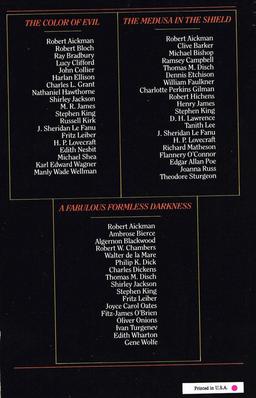 Here’s the complete Table of Contents:
Here’s the complete Table of Contents:
Introduction by David G. Hartwell
“The Reach” by Stephen King (1981)
“Evening Primrose” by John Collier (1940)
“The Ash-Tree” by M. R. James (1904)
“The New Mother” by Lucy Clifford (1882)
“There’s a Long, Long Trail A-Winding” by Russell Kirk (1976)
“The Call of Cthulhu” by H. P. Lovecraft (1928)
“The Summer People” by Shirley Jackson (1950)
“The Whimper of Whipped Dogs” by Harlan Ellison (1973)
“Young Goodman Brown” by Nathaniel Hawthorne (1835)
“Mr. Justice Harbottle” by Joseph Sheridan Le Fanu (1872)
“The Crowd” by Ray Bradbury (1943)
“The Autopsy” by Michael Shea (1980)
“John Charrington’s Wedding” by E. Nesbit (1891)
“Sticks” by Karl Edward Wagner (1974)
“Larger Than Oneself” by Robert Aickman (1966)
“Belsen Express” by Fritz Leiber (1975)
“Yours Truly, Jack the Ripper” by Robert Bloch (1943)
“If Damon Comes” by Charles L. Grant (1978)
“Vandy, Vandy” by Manly Wade Wellman (1953)
“The Swords” by Robert Aickman (1969)
“The Roaches” by Thomas M. Disch (1965)
“Bright Segment” by Theodore Sturgeon (1955)
“Dread” by Clive Barker (1984)
“The Fall of the House of Usher” by Edgar Allan Poe (1839)
“The Monkey” by Stephen King (1980)
“Within the Walls of Tyre” by Michael Bishop (1978)
“The Rats in the Walls” by H. P. Lovecraft (1924)
“Schalken the Painter” by Joseph Sheridan Le Fanu (1935)
“The Yellow Wallpaper” by Charlotte Perkins Gilman (1892)
“A Rose for Emily” by William Faulkner (1930)
“How Love Came to Professor Guildea” by Robert Hichens (1897)
“Born of Man and Woman” by Richard Matheson (1950)
“My Dear Emily” by Joanna Russ (1962)
“You Can Go Now” by Dennis Etchison (1980)
“The Rocking-Horse Winner” by D. H. Lawrence (1926)
“Three Days” by Tanith Lee (1984)
“Good Country People” by Flannery O’Connor (1955)
“Mackintosh Willy” by Ramsey Campbell (1979)
“The Jolly Corner” by Henry James (1908)
“Smoke Ghost” by Fritz Leiber (1941)
“Seven American Nights” by Gene Wolfe (1978)
“The Signalman” Charles Dickens (1866)
“Crouch End” by Stephen King (1980)
“Night-Side” by Joyce Carol Oates (1977)
“Seaton’s Aunt” by Walter de la Mare (1922)
“Clara Militch” by Ivan Turgenev (1897)
“The Repairer of Reputations” by Robert W. Chambers (1895)
“The Beckoning Fair One” by Oliver Onions (1911)
“What Was It?” Fitz-James O’Brien (1859)
“The Beautiful Stranger” by Shirley Jackson (1968)
“The Damned Thing” by Ambrose Bierce (1893)
“Afterward” by Edith Wharton (1910)
“The Willows” by Algernon Blackwood (1907)
“The Asian Shore” by Thomas M. Disch (1970)
“The Hospice” by Robert Aickman (1975)
“A Little Something for Us Tempunauts” by Philip K. Dick (1974)
The Dark Descent was reprinted in three sizable paperback volumes by Tor, and by Grafton in the UK. Here’s the deets on the US versions:
The Color of Evil (438 pages, $4.99, September 1991)
The Medusa in the Shield (498 pages, $4.99, November 1991)
A Fabulous Formless Darkness (585 pages, $4.99, January 1992)
I’m too lazy to include the Table of Contents for each of the individual paperbacks, but you can see the authors for each listed on the back cover of the trade paperback edition (above right).
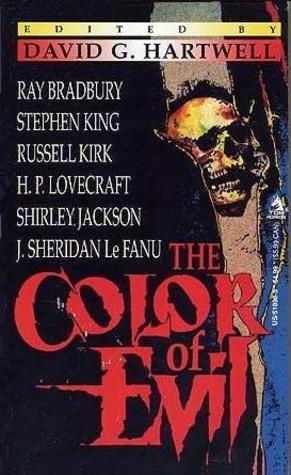 |
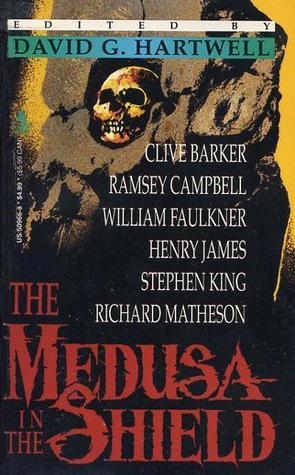 |
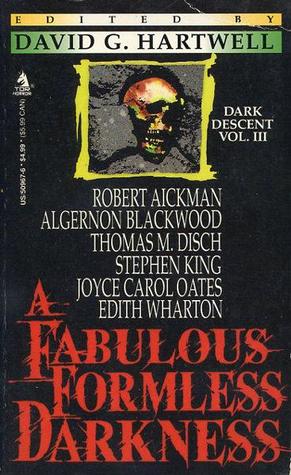 |
The Dark Descent was published by Tor in October 1987. It is 1011 pages, priced at $29.95 in hardcover. The cover was by Doug Fornuff. There was a one-volume trade paperback edition by Tor and the Book of the Month Club in 1988, and again in 1997.
For those looking for something a little broader in their reading, I highly recommend the massive anthology The World Treasury of Science Fiction, published by Little, Brown in January 1989, as part of Clifton Fadiman’s World Treasury line (which also included the two-volume World Treasury of Children’s Literature and The World Treasury of Love Stories, among others). Weighing in at a massive 1104 pages (including David’s 21-page introduction), it looks at modern SF from a global perspective.
Here’s the Publishers Weekly review:
SF historian and editor Hartwell, who in little more than a year has produced massive anthologies of horror (The Dark Descent) and fantasy (Masterpieces of Fantasy and Enchantment), now performs a similar service for SF readers with this chest-denting, 1100-page volume. He has brought together 53 selections, virtually every one of high quality, fully a third from Europe, Asia or Latin America. Among the best stories in this first-rate collection are J. G. Ballard’s “Chronopolis,” about a future in which time pieces are outlawed; Robert Sheckley’s “Ghost V,” set on a paradise planet haunted by monsters from the subconscious, a story that expertly mixes suspense and humor; Philip K. Dick’s chilling future war scenario, “Second Variety”; Larry Niven’s tale of night of apocalyptic change, “Inconstant Moon”; and “Vintage Season,” about decadent time tourists who travel to historical tragedies to enjoy them as theater, by Henry Kuttner and his wife, C. L. Moore. There are also fine tales by Gene Wolfe, Arthur C. Clarke, Stanislaw Lem, Fritz Leiber, C. M. Kornbluth, Ursula LeGuin, Robert Heinlein, Italo Calvino, Thomas Disch and John Updike. The editor has contributed a scholarly, engaging introduction to each story.
The World Treasury of Science Fiction includes splendid short fiction from the finest American practitioners, including John W. Campbell, Kurt Vonnegut, Theodore Sturgeon, John Updike, Robert A. Heinlein, Ursula K. Le Guin, and Samuel R. Delany, as well as international authors such as J. G. Ballard, Arthur C. Clarke, Alfred Bester, Stanislaw Lem, Italo Calvino, Jorge Luís Borges, Brian W. Aldiss, and Keith Roberts. Like The Dark Descent, it also includes five classic novellas:
“The Lineman” by Walter M. Miller, Jr. (1957)
“Two Dooms” by C. M. Kornbluth (1958)
“The Fifth Head of Cerberus” by Gene Wolfe (1972)
“The Gold at the Starbow’s End” by Frederik Pohl (1972)
“The Way to Amalteia” by Arkady Strugatsky and Boris Strugatsky (1984)
Here’s the complete Table of Contents:
Foreword by Clifton Fadiman
Introduction by David G. Hartwell
“Harrison Bergeron” by Kurt Vonnegut, Jr. (1961)
“Forgetfulness” by John W. Campbell, Jr. (1937)
“Special Flight” by John Berryman (1939)
“Chronopolis” by J. G. Ballard (1960)
“Triceratops”by Tensei Kono (1982)
“The Man Who Lost the Sea” by Theodore Sturgeon (1959)
” On the Inside Track” by Karl Michael Armer (1986)
“The Golem” by Avram Davidson (1955)
“The New Prehistory” by René Rebetez-Cortes (1983)
“A Meeting With Medusa” by Arthur C. Clarke (1971)
“The Valley of Echoes” by Gérard Klein (1973)
“The Fifth Head of Cerberus” by Gene Wolfe (1972)
“The Chaste Planet” by John Updike (1975)
“The Blind Pilot” by Nathalie Henneberg (1960)
“The Men Who Murdered Mohammed” by Alfred Bester (1958)
“Pairpuppets” by Manuel van Loggem (1976)
“Two Dooms” by C. M. Kornbluth (1958)
“Tale of the Computer That Fought a Dragon” by Stanislaw Lem (1977)
“The Green Hills of Earth” by Robert A. Heinlein (1947)
“Ghost V” by Robert Sheckley (1954)
“The Phantom of Kansas” by John Varley (1976)
3″Captain Nemo’s Last Adventure” by Josef Nesvadba (1973)
“Inconstant Moon” by Larry Niven (1971)
“The Gold at the Starbow’s End” by Frederik Pohl (1972)
“A Sign in Space” by Italo Calvino (1968)
“The Spiral” by Italo Calvino (1968)
“The Dead Past” by Isaac Asimov (1956)
“The Lens” by Annemarie van Ewijck (1984)
“The Hurkle Is a Happy Beast” by Theodore Sturgeon (1949)
“Zero Hour” by Ray Bradbury (1947)
“Nine Lives” by Ursula K. Le Guin (1969)
“The Muse” by Anthony Burgess (1968)
“The Public Hating” by Steve Allen (1955)
“Poor Superman” by Fritz Leiber (1951)
“Angouleme” by Thomas M. Disch (1971)
“Stranger Station” by Damon Knight (1956)
“The Dead Fish” by Boris Vian (1955)
“I Was the First to Find You” by Kir Bulychev (1977)
“The Lineman” by Walter M. Miller, Jr. (1957)
“Tlön, Uqbar, Orbis Tertius” by Jorge Luís Borges (1961)
“Codemus” by Tor Åge Bringsvaerd (1976)
“A Kind of Artistry” by Brian W. Aldiss (1962)
“Second Variety” by Philip K. Dick (1953)
“Weihnachtsabend” by Keith Roberts (1972)
“I Do Not Love Thee, Doctor Fell” by Robert Bloch (1955)
“Aye, and Gomorrah…” by Samuel R. Delany (1967)
“How Erg the Self-Inducting Slew a Paleface” by Stanislaw Lem (1977)
“Nobody’s Home” by Joanna Russ (1972)
“Party Line” by Gérard Klein (1976)
“The Proud Robot” by Henry Kuttner and C. L. Moore (1943)
“Vintage Season” by Henry Kuttner and C. L. Moore (1946)
“The Way to Amalteia” by Arkady Strugatsky and Boris Strugatsky (1984)
Acknowledgements by David G. Hartwell
The World Treasury of Science Fiction was published by Little, Brown in February 1989. It is 1104 pages, priced at $22.95 in hardcover. The cover was by Bob Eggleton. A one-volume trade paperback edition was published by the Quality Paperback Book Club in June 1989.
The articles in our David Hartwell tribute series are:
The Masterpieces of Fantasy
The Dark Descent and The World Treasury of Science Fiction
The Early Horror Paperbacks
Foundations of Fear and The Ascent of Wonder
The Canadian Anthologies
Visions of Wonder and The Science Fiction Century
See all of our recent Vintage Treasures here.
Beyond the Vandermeers’ massive and fairly recent Weird volume, is anybody doing anything like these historically focused, or historically contextualized, anthologies anymore? It seems to me that themed and year’s best are sort of the rage with anthologies right now (or maybe that’s always been the case).
James,
Great question!
No one is doing it with the depth or insight of David Hartwell. However, I have heartily enjoyed Otto Penzler’s massive paperback anthologies, including the 1,056-page The Vampire Archives, The Big Book of Adventure Stories, The Big Book of Christmas Mysteries, The Big Book of Sherlock Holmes Stories, and The Big Book of Ghost Stories.
We’ve covered a few of them at Black Gate:
https://www.blackgate.com/2014/01/24/new-treasures-the-vampire-archives-edited-by-otto-penzler/
https://www.blackgate.com/2014/01/15/new-treasures-the-big-book-of-adventure-stories-edited-by-otto-penzler/
https://www.blackgate.com/2015/10/23/future-treasures-the-big-book-of-sherlock-holmes-stories-edited-by-otto-penzler/
Otto Penzler
Thanks, I’ll keep that name in mind.
For a great, recent anthology check out
The Wesleyan Anthology of Science Fiction.
http://www.upne.com/0819569547.html
Table of Contents
• Introduction
• CHRONOLOGICAL LISTING OF STORIES
• Nathaniel Hawthorne, “Rappaccini’s Daughter” (1844)
• Jules Verne, from Journey to the Center of the Earth (1864)
• H. G. Wells, “The Star” (1897)
• E. M. Forster, “The Machine Stops” (1909)
• Edmond Hamilton, “The Man Who Evolved” (1931)
• Leslie F. Stone, “The Conquest of Gola” (1931)
• C. L. Moore, “Shambleau” (1933)
• Stanley Weinbaum, “A Martian Odyssey” (1934)
• Isaac Asimov, “Reason” (1941)
• Clifford D. Simak, “Desertion” (1944)
• Theodore Sturgeon, “Thunder and Roses” (1947)
• Judith Merril, “That Only a Mother” (1948)
• Fritz Leiber, “Coming Attraction” (1950)
• Ray Bradbury, “There Will Come Soft Rains” (1950)
• Arthur C. Clarke, “The Sentinel” (1951)
• Robert Sheckley, “Specialist” (1953)
• William Tenn, “The Liberation of Earth” (1953)
• Alfred Bester, “Fondly Fahrenheit” (1954)
• Avram Davidson, “The Golem” (1955)
• Cordwainer Smith, “The Game of Rat and Dragon” (1955)
• Robert A. Heinlein, “ ‘All You Zombies—’” (1959)
• J. G. Ballard, “The Cage of Sand” (1962)
• R. A. Lafferty, “Slow Tuesday Night” (1965)
• Harlan Ellison, “‘Repent, Harlequin!’ Said the Ticktockman” (1965)
• Frederik Pohl, “Day Million” (1966)
• Philip K. Dick, “We Can Remember It for You Wholesale” (1966)
• Samuel R. Delany, “Aye, and Gomorrah . . .” (1967)
• Pamela Zoline, “The Heat Death of the Universe” (1967)
• Robert Silverberg, “Passengers” (1968)
• Brian Aldiss, “Super-Toys Last All Summer Long” (1969)
• Ursula K. Le Guin, “Nine Lives” (1969)
• Frank Herbert, “Seed Stock” (1970)
• Stanislaw Lem, “The Seventh Voyage,” from The Star Diaries (1971)
• Joanna Russ, “When It Changed” (1972)
• James Tiptree Jr., “And I Awoke and Found Me Here on the Cold Hill’s Side” (1972)
• John Varley, “Air Raid” (1977)
• Carol Emshwiller, “Abominable” (1980)
• William Gibson, “Burning Chrome” (1982)
• Octavia E. Butler, “Speech Sounds” (1983)
• Nancy Kress, “Out of All Them Bright Stars” (1985)
• Pat Cadigan, “Pretty Boy Crossover” (1986)
• Kate Wilhelm, “Forever Yours, Anna” (1987)
• Bruce Sterling, “We See Things Differently” (1989)
• Misha Nogha, “Chippoke Na Gomi” (1989)
• Eileen Gunn, “Computer Friendly” (1989)
• John Kessel, “Invaders” (1990)
• Gene Wolfe, “Useful Phrases” (1992)
• Greg Egan, “Closer” (1992)
• James Patrick Kelly, “Think Like a Dinosaur” (1995)
• Geoff Ryman, “Everywhere” (1999)
• Charles Stross, “Rogue Farm” (2003)
• Ted Chiang, “Exhalation” (2008)
• THEMATIC LISTING OF STORIES
• Alien Encounters
• C. L. Moore, “Shambleau” (1933)
• Stanley Weinbaum, “A Martian Odyssey” (1934)
• Arthur C. Clarke, “The Sentinel” (1951)
• Robert Sheckley, “Specialist” (1953)
• Robert Silverberg, “Passengers” (1968)
• Nancy Kress, “Out of All Them Bright Stars” (1985)
• Gene Wolfe, “Useful Phrases” (1992)
• James Patrick Kelly, “Think Like a Dinosaur” (1995)
• Apocalypse and Post-apocalypse
• H. G. Wells, “The Star” (1897)
• Fritz Leiber, “Coming Attraction” (1950)
• Ray Bradbury, “There Will Come Soft Rains” (1950)
• J. G. Ballard, “The Cage of Sand” (1962)
• Octavia E. Butler, “Speech Sounds” (1983)
• Misha Nogha, “Chippoke Na Gomi” (1989)
• Artificial/Posthuman Life-forms
• Nathaniel Hawthorne, “Rappaccini’s Daughter” (1844)
• Isaac Asimov, “Reason” (1941)
• Alfred Bester, “Fondly Fahrenheit” (1954)
• Avram Davidson, “The Golem” (1955)
• Brian Aldiss, “Super-Toys Last All Summer Long” (1969)
• Ursula K. Le Guin, “Nine Lives” (1969)
• Ted Chiang, “Exhalation” (2008)
• Computers and Virtual Reality
• Philip K. Dick, “We Can Remember It for You Wholesale” (1966)
• William Gibson, “Burning Chrome” (1982)
• Pat Cadigan, “Pretty Boy Crossover” (1986)
• Eileen Gunn, “Computer Friendly” (1989)
• Evolution and Environment
• Jules Verne, from Journey to the Center of the Earth (1864)
• Edmond Hamilton, “The Man Who Evolved” (1931)
• Clifford D. Simak, “Desertion” (1944)
• Frank Herbert, “Seed Stock” (1970)
• Charles Stross, “Rogue Farm” (2003)
• Gender and Sexuality
• Leslie F. Stone, “The Conquest of Gola” (1931)
• Frederik Pohl, “Day Million” (1966)
• Samuel R. Delany, “Aye, and Gomorrah . . .” (1967)
• Pamela Zoline, “The Heat Death of the Universe” (1967)
• Joanna Russ, “When It Changed” (1972)
• James Tiptree Jr., “And I Awoke and Found Me Here on the Cold Hill’s Side” (1972)
• Carol Emshwiller, “Abominable” (1980)
• Greg Egan, “Closer” (1992)
• Time Travel and Alternate History
• Robert A. Heinlein, “ ‘All You Zombies—’” (1959)
• Stanislaw Lem, “The Seventh Voyage” from Star Diaries (1971)
• John Varley, “Air Raid” (1977)
• Kate Wilhelm, “Forever Yours, Anna” (1987)
• John Kessel, “Invaders” (1990)
• Utopias/Dystopias
• E. M. Forster, “The Machine Stops” (1909)
• R. A. Lafferty, “Slow Tuesday Night” (1965)
• Harlan Ellison, “‘Repent, Harlequin!’ Said the Ticktockman” (1965)
• Geoff Ryman, “Everywhere” (1999)
• War and Conflict
• Theodore Sturgeon, “Thunder and Roses” (1947)
• Judith Merril, “That Only a Mother” (1948)
• William Tenn, “The Liberation of Earth” (1953)
• Cordwainer Smith, “The Game of Rat and Dragon” (1955)
• Bruce Sterling, “We See Things Differently” (1989)
• Acknowledgments
• Further Reading
James,
I concur! I should have thought of that one. We covered it here four years ago:
https://www.blackgate.com/2012/03/23/new-treasures-the-wesleyan-anthology-of-science-fiction/
Thanks James! I actually checked this out of the library a few years ago and completely forgot about it.
Yeah, this volume should not be forgotten!
I also read Hartwell & Cramer’s Space Opera Renaissance this summer. That was a massive, massive tome of literary goodness.